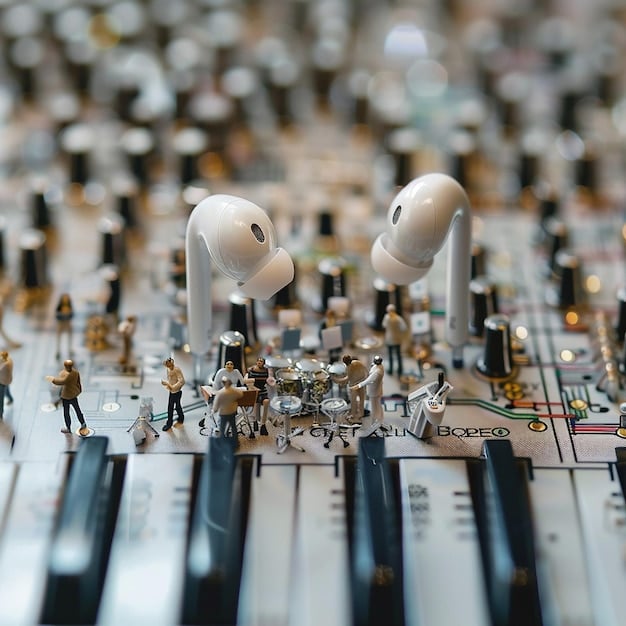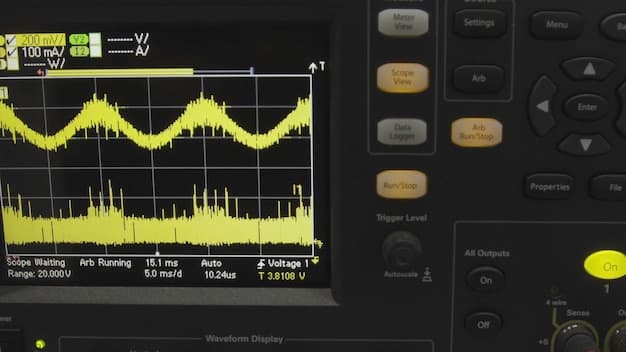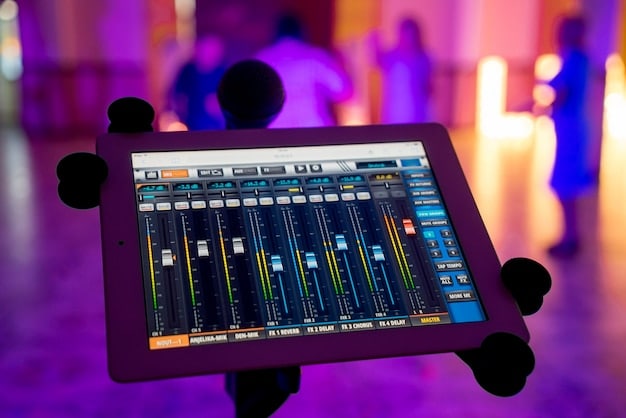The Impact of AI on Underground Rap: New Tools and Tech for Artists

The Impact of AI on Underground Rap is transforming how underground artists create, distribute, and engage with their music, offering new avenues for creativity and audience connection.
The underground rap scene has always been a hotbed of innovation, and now, the impact of AI on underground rap: new tools and technologies for artists is adding a whole new dimension. From creating unique beats to automating marketing tasks, AI is reshaping the entire music creation and distribution process.
AI-Powered Beat Creation: A New Soundscape
One of the most significant areas of the impact of AI on underground rap: new tools and technologies for artists is beat creation. AI tools are now capable of generating unique and complex beats, providing artists with a virtually limitless source of inspiration.
AI Beat Generators: How They Work
AI beat generators use machine learning algorithms to analyze vast libraries of existing music, identifying patterns and structures. This allows them to create original beats that can be customized to fit an artist’s specific style and preferences. The tools work by allowing the user to input parameters such as tempo, key, and genre.
Benefits for Underground Artists
For underground artists, AI beat generators offer several advantages. They lower the barrier to entry by providing access to high-quality beats without the need for expensive studio equipment or collaborations with established producers. This democratization of music creation empowers artists to experiment and push creative boundaries.
- Accessibility: AI tools make beat creation accessible to artists with limited resources.
- Innovation: AI can generate beats that artists might not have conceived on their own, fostering originality.
- Efficiency: AI streamlines the beat-making process, saving time and effort.
In summary, AI-powered beat creation is leveling the playing field for underground artists, offering new avenues for creative expression and musical innovation.

AI-Assisted Lyrics and Songwriting
Beyond beat creation, AI is also making waves in the realm of lyrics and songwriting. AI-powered tools can assist artists in crafting compelling lyrics, generating rhymes, and even suggesting song structures.
AI Lyric Generators: A Muse for Wordsmiths
AI lyric generators analyze existing lyrics to understand patterns in rhyme, meter, and theme. Artists can input keywords, topics, or emotions, and the AI will generate lyrics that align with these inputs. These tools don’t replace the artist’s creativity but serve as a muse, sparking new ideas and overcoming writer’s block.
Enhancing Songwriting with AI
AI tools can also assist in structuring songs, suggesting chord progressions, and identifying hooks. This assistance can be particularly valuable for artists who are new to songwriting or who want to experiment with different musical forms. By providing a framework, AI allows artists to focus on the emotional and artistic aspects of their music.
AI-assisted lyrics and songwriting tools are evolving rapidly, becoming increasingly sophisticated and capable of producing nuanced and compelling content. These tools are not intended to replace human creativity but rather to augment it, providing artists with new avenues for expression.
AI in Music Production and Sound Engineering
The impact of AI extends to the intricacies of music production and sound engineering. AI-driven tools are simplifying complex processes, allowing artists to achieve professional-quality sound without extensive technical expertise.
AI Mastering and Mixing: Achieving Professional Sound
Mastering and mixing are crucial steps in music production, but they often require specialized skills and expensive equipment. AI-powered mastering and mixing tools offer automated solutions that analyze audio tracks and apply adjustments to achieve optimal sound quality. This technology levels the playing field, making professional-sounding music accessible to a broader range of artists.
Automated Sound Engineering Tasks
AI is also automating various sound engineering tasks, such as noise reduction, equalization, and compression. These tools can quickly and accurately process audio, saving artists valuable time and effort. By automating these tasks, AI allows artists to focus on the creative aspects of their music.
- Efficiency: AI automates time-consuming sound engineering tasks.
- Accessibility: AI lowers the barrier to entry for high-quality sound production.
- Consistency: AI ensures consistent sound quality across different tracks.
AI is revolutionizing music production and sound engineering, making professional-quality sound accessible to underground artists who may not have access to traditional resources.

AI-Driven Music Distribution and Marketing
The impact of AI extends beyond music creation to distribution and marketing. AI-powered tools are helping underground artists reach wider audiences, automate marketing tasks, and make data-driven decisions.
Automated Social Media Marketing
Promoting music on social media can be time-consuming and challenging. AI-powered marketing tools can automate tasks such as scheduling posts, creating engaging content, and targeting specific audiences. This allows artists to focus on their music while AI handles the marketing logistics.
Data-Driven Insights for Musicians
AI can analyze vast amounts of data to provide insights into audience preferences, track performance, and identify trends. This information helps artists make informed decisions about their music, marketing strategies, and career paths. By leveraging data, artists can optimize their efforts and increase their chances of success.
AI is transforming music distribution and marketing, providing underground artists with the tools they need to reach wider audiences, automate marketing tasks, and make data-driven decisions. This empowers artists to take control of their careers and build sustainable businesses.
AI and the Future of Live Performances
AI is playing a role in live performances, enhancing the audience experience and providing artists with new ways to interact with their fans. As the impact of AI on underground rap: new tools and technologies for artists continues to grow, live performances are also being affected.
AI-Enhanced Visuals and Stage Effects
AI can generate real-time visuals and stage effects that respond to the music and the audience’s reactions. This creates immersive and engaging experiences that enhance the overall atmosphere of the performance. AI-driven visuals can synchronize with the music, creating a dynamic and captivating show.
Interactive Performances with AI
AI can enable interactive performances that allow the audience to participate in the music-making process. For example, AI can analyze audience feedback and adjust the music in real-time, creating a personalized experience for each show. This level of interaction fosters deeper connections between artists and their fans.
AI is enhancing live performances, providing artists with new ways to engage with their audiences and create memorable experiences. This technology is transforming the live music scene, making it more interactive, immersive, and personalized.
Ethical Considerations and the Human Element
While AI offers many benefits, it also raises ethical considerations. It’s crucial to maintain a balance between AI assistance and human creativity to ensure music remains authentic and meaningful. In examining the impact of AI on underground rap: new tools and technologies for artists, we must also consider the ethical implications.
Balancing AI Assistance with Human Creativity
AI should be used as a tool to augment human creativity, not replace it. Artists should retain control over their music and ensure that it reflects their unique perspectives and emotions. The best collaborations involve AI enhancing human ingenuity, but not surpassing it.
Avoiding Over-Reliance on AI
It’s important for artists to develop their own skills and not become overly reliant on AI. While AI can automate tasks and provide inspiration, it cannot replace the artistry and passion that drives music. Authenticity is vital in the music scene, and therefore, one should not rely completely on AI.
As AI continues to evolve, it’s crucial to address these ethical considerations and ensure that technology is used responsibly and ethically in the music industry. By maintaining a balance between AI assistance and human creativity, we can harness the power of technology while preserving the authenticity and meaning of music.
| Key Aspect | Brief Description |
|---|---|
| 🎶 AI Beat Creation | AI tools generate unique beats, providing endless inspiration. |
| ✍️ AI Lyrics & Songwriting | AI assists in crafting lyrics, suggesting structures, and creating rhymes. |
| 🎤 AI Music Production | AI simplifies mastering, mixing, and automated sound engineering tasks. |
| 🚀 AI Marketing & Distribution | AI automates marketing on social media and provides data-driven insights. |
Frequently Asked Questions
▼
AI beat generators are providing affordable access to unique, customizable beats, empowering artists with fewer resources to innovate and experiment creatively without the need for traditional studio setups.
▼
AI lyric tools can propose rhymes and thematic elements, aiding songwriters in overcoming writer’s block. While not replacing human creativity, they offer a starting point for more sophisticated lyrics.
▼
AI tools automate social media postings and analyze audience data, helping artists focus on their music while still targeting interested fans efficiently and making data-backed decisions.
▼
AI dynamically creates visuals reacting to music in real-time and enables audience participation, leading to more interactive and immersive shows that deepen the artist-fan connection through technology.
▼
Ethical considerations revolve around maintaining human creativity and authenticity. It’s crucial to avoid over-reliance on AI and keep the artist’s emotions at the center of the creative processes.
Conclusion
The integration of AI into underground rap is an evolving narrative, one where technology serves as a powerful ally to creativity. As these tools become more refined, the future of music may be shaped by the innovative collaborations between human artists and artificial intelligence, promising groundbreaking sounds and experiences.





